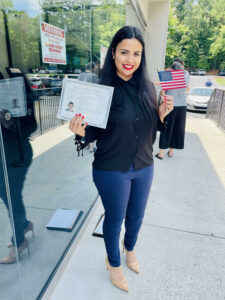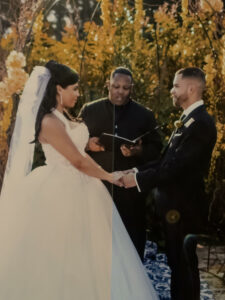We’re back this month with another installment of our Stories of Hope series. With the goal of highlighting the journeys and backgrounds of the immigrants that are woven into our community, we are honored to feature Jackie from Brazil this month.
Coming to America
 Jackie left her life in Brazil fifteen years ago. Her mom left Brazil for the US when Jackie was seven years old to pursue a better life, so Jackie was raised by her aunt in Brazil while her mother was away. After seven years, at the age of thirteen, Jackie’s eyes began to open to the world around her. She realized, “This is where I live and there’s nothing here. Everybody at my age was pretty much getting pregnant and there was like no future, nothing past high school. And it just didn’t seem like I fit in.” Pondering her options, “It just felt like there’s gotta be something more. My mom lives in the US and what am I doing?”
Jackie left her life in Brazil fifteen years ago. Her mom left Brazil for the US when Jackie was seven years old to pursue a better life, so Jackie was raised by her aunt in Brazil while her mother was away. After seven years, at the age of thirteen, Jackie’s eyes began to open to the world around her. She realized, “This is where I live and there’s nothing here. Everybody at my age was pretty much getting pregnant and there was like no future, nothing past high school. And it just didn’t seem like I fit in.” Pondering her options, “It just felt like there’s gotta be something more. My mom lives in the US and what am I doing?”
So, she reached out to her mom and told her she wanted to join her in the US. Making the journey, she had to leave everything behind. “When I came here, I really knew what the deal was and how I had to come as if I was coming for just vacation.” With just a carry-on, most things had to be left behind. “My books, notebooks with poems and stuff that I used to just write randomly. But everything kind of got left behind and it was hard, but I built a whole new life here.”
Leaving your home country, especially that young, is always hard. Describing how she felt at the time, Jackie says “When I left Brazil, I was kind of anxious. But I was also excited because I was just ready to get out of where I was. It wasn’t like I was anywhere pretty, so there was a sense of hope when I moved here. Then, once I got here, I was like, ‘Oh my gosh, this is amazing.’”
One thing that excited her the most was her love of the movie High School Musical. “I just loved that movie. And I was obsessed with Zac Efron and the school.” Watching the movie in Brazil, “I just remember being amazed, with these hallways and lockers.” Her school in Brazil was “just bricks and cement; we had no computers, let alone those fancy calculators or lockers.” So when she realized the school she saw on Disney Channel at home in Brazil was the type of school she’d attend in the US, she was over the moon.
Of course, as excited as she was, moving to a country comes with its ups and downs. “Settling in with culture and I spoke no English, it was definitely a cultural shock. When school started, the first three months of my eighth-grade year were probably the roughest.” Because of her age and language skills at the time, they had her in eighth grade instead of ninth. Eventually, with ESL classes, she was able to meet people and make some friends that helped her settle in. Although it was rough at first, “it was all for the better — even as a kid, as a 13-year-old, I just knew it was a sacrifice and this was to ride the wave.”
The Journey to Status
With her mom already in the US, she joined her, with the goal of attending school and learning English. But Jackie faced the challenge of being undocumented when she first arrived in the US. When DACA was implemented in 2012, she thought it was her chance to have a bit more security. “I didn’t have my documents. So when DACA came, it seemed like the perfect opportunity, and at the time I had just graduated high school. So I was fairly young, looking to get out and be an adult and have a real job, be a good citizen.” Unfortunately, although she persisted with her applications, she fell short by ten days with her arrival. Arriving just ten days after the cut-off date, she no longer qualified. “So they always denied with that excuse in hand and always with the letters that were the sole excuse. And it was really upsetting and there was nothing I could do.”
With nothing more she could do, “I kept living the way that I was.” But being undocumented continued to follow her in her daily life. Although she desperately wanted status, she had to keep living without it. In 2013, “I got into a horrible accident where I was hit by a train and I had this medical emergency and I had no documents and I had no health insurance.” Thankfully, she survived the accident, but she “survived with $80,000 worth of bills at the age of 21.” Even so, those around her kept urging her to try again with her immigration status. They said, “You’ve been through this horrible accident and somebody needs to have mercy on your soul.”
Besides her status, Jackie was an outstanding member of the community — “no police arrests, no nothing, no criminal background.” But this one thing stood in her way, “You know, a lot of people are worse and have everything. So I went out and I looked for several different lawyers. I’ll never forget, I was cold-calling random lawyers’ offices. And this one lawyer referred me to Tracie. And she said the same thing as everyone else like ‘This can’t be, what is wrong with the system?’” Those ten days that had been looming over her for years were all because of a stamp in her passport, a stamp from 2007 years before DACA was even talked about. Never could she have known that those ten days would make such a difference in her life.
Jackie describes working through her case as walking into a maze. With Tracie taking on her case, they now had the train accident and other humanitarian grounds to add. But, “it just did not work out. And it was just always a dead end. But we tried again, we appealed, we did everything we can think of that could’ve possibly been done and it just didn’t work out until way later.” Luckily, many years later, Jackie fell in love. “I met my husband and we got married and that’s finally how I was able to get anything done.” Tracie was there through all stages of the process, almost ten years until they found a solution. Jackie reflects in amazement at how “it took me to get married in order to get anything solved in a way. And it’s just frustrating because I was so young, just like everyone else who received benefits from DACA.”
 Thinking back, Jackie is still shocked about how it all panned out. “Just somehow along the way it worked, but it wasn’t easy before I got married. I had all this drive, but I was still so limited. It was suffocating. It was a lot, to go to school, to attend school, attend college, and not be able to apply for financial support or just have to pay cash. It’s suffocating. Or to even finish school and not be able to have a job on my degree, because I don’t have social security or a work permit.” But, the second “you get the papers, life gets easier.” It is astounding what a big difference one piece of paper can make. In 2022, Jackie received another important piece of paper, a naturalization certificate, and became a proud citizen of the United States.
Thinking back, Jackie is still shocked about how it all panned out. “Just somehow along the way it worked, but it wasn’t easy before I got married. I had all this drive, but I was still so limited. It was suffocating. It was a lot, to go to school, to attend school, attend college, and not be able to apply for financial support or just have to pay cash. It’s suffocating. Or to even finish school and not be able to have a job on my degree, because I don’t have social security or a work permit.” But, the second “you get the papers, life gets easier.” It is astounding what a big difference one piece of paper can make. In 2022, Jackie received another important piece of paper, a naturalization certificate, and became a proud citizen of the United States.
Calling America Home
Jackie states how it’s hard to pinpoint when she first started feeling at home in the US, that it wasn’t a specific moment. “I kind of always felt at home, like within five years I started feeling at home, but then I also was feeling uncomfortable because of my immigration status.” In a sense, it is difficult to even determine what home really means in that situation, being between countries, between status. Having to deal with the anxiety and paranoia of being undocumented, “I was feeling sketchy, like something is off like it’s like I’m on the run or something.”
Leaving at such a young age, her life changed drastically and quickly. At a mere thirteen years old, she left behind everything and everyone she knew. It can be extremely daunting to move to a new country, culture, and language. However, after slowly adapting, Jackie says that she started to flourish. Reflecting, she thinks that if those people  “would see me now, they would say that I kind of came out of my shell.” Although she was living with the pressures of immigration status, she slowly was able to branch out into her new life. “I just kind of opened up and I started enjoying different things and even enjoying different foods that I wouldn’t necessarily try. I was intrigued by different cultures. I became this independent animal.”
“would see me now, they would say that I kind of came out of my shell.” Although she was living with the pressures of immigration status, she slowly was able to branch out into her new life. “I just kind of opened up and I started enjoying different things and even enjoying different foods that I wouldn’t necessarily try. I was intrigued by different cultures. I became this independent animal.”
Then, once she got married, “it was like I can breathe and I’m home.” Now, ten years after first coming to the US, Jackie says she feels at home, “Now more than ever.” Being able to let go of that anxiety, “I always tell people like Atlanta is home to me. This is my home. It’s like I was meant to be here.”
Community and Immigrants

When Jackie was asked about the message she wanted to convey to the community, she shared a powerful sentiment.
“I wish that community knew that we’re here to make this place better. A lot of us are here to stay and we’re here to do better and make this country a better place for all of us.” Jackie passionately states. Arriving in the United States as a teenager, she came with a big dream of a better life for herself, transitioning from a small town to the bustling energy of a big city. And, like countless other immigrants in the U.S., Jackie’s pursuit of success was driven by a desire for a better life. She knew that achieving these goals would require hard work and determination. “These things, they don’t just naturally come to your door. It’s really, how about how much hard work, you know? You can have whatever you want. And you’ll make life what you want out of it. You don’t just let life happen to you,” she emphasizes.
Jackie and other immigrants made many sacrifices when they came to the United States. They couldn’t just go with the flow of life; they had to take charge of their own lives. Some people are luckier and don’t have to work as hard to have a good life. Jackie wants those fortunate people to remember how lucky they are and realize that many immigrants who come to the U.S. to make their lives better and help their new communities don’t always have it as easy.


